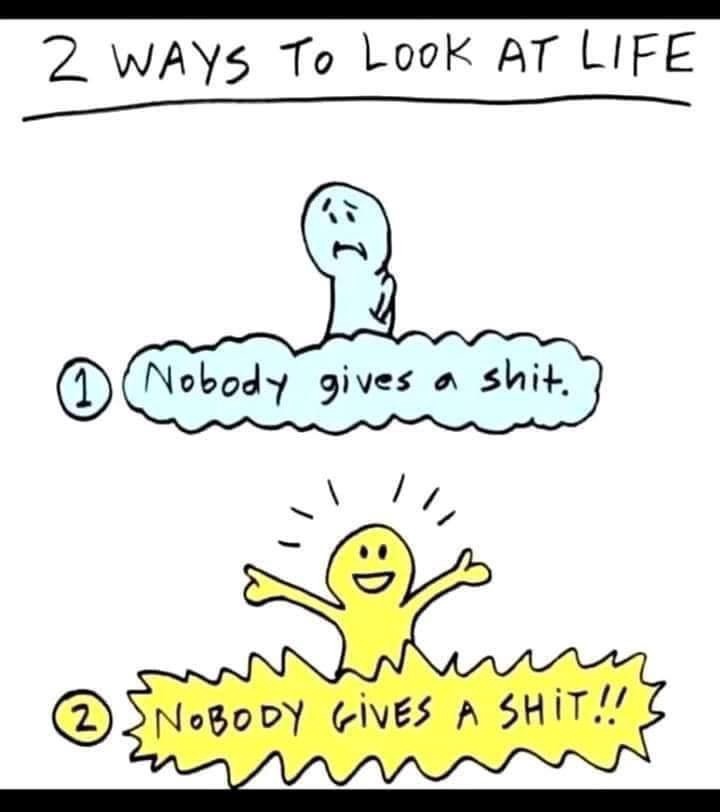Metric yes please. Also for fucks sake use the 24 hour clock. Some of us learned it from the military but it’s just earth time and way easier than adding letters to a number
Why would you demand metric everything and not metric time?
Cause then we’d be thinking we’re monkeys on a spherical rock in a vacuum instead of calibrating clocks to a radioactive element to make sure everyone tunes in to wheel of fortune on time while this oblate spheroid tumbles around
Also, it’s hard enough getting people to equate Km and C with known quantities, Americans can’t handle base unit shifts like that
Cause then we’d be thinking we’re monkeys on a spherical rock in a vacuum instead of calibrating clocks to a radioactive element to make sure everyone tunes in to wheel of fortune on time while this oblate spheroid tumbles around
Just a little sodium chloride
If America is going to go through the trouble to convert everything to metric, might as well switch to base 10/decimal time as well lol
The 12 hour one is just so wildly dumb and inconsistent.
Why does it go from 11 AM to 12 PM to 1 PM?
I love the 24 hour clock and living in London, UK I used it all the time. However, I remember one time I bought movie tickets at lunch for 17:30 and my brain thought it was for 7:30pm and I called my friend at the last moment saying: “you have to leave work early if we’re gonna make it!”
Why no base10 clock?
You don’t need to add or multiply time very often. Division is super important tho, and base60 is better than base10 for that.
Too easy. Plus we put in the 3/5 “compromise” so you can’t expect old white racists to learn proper math
base12 has the advantage of being divisible by 2, 3, 4 and 6, while base10 is only divisible by 2 and 5.
Ahh, another connoisseur of the Dozenal system! Everyone should add a little dek and el to their life!
So you’re arguing in favor of feet and inches?
You listed 2 twice(thrice if counting 6) for base12 and once for base10. Generally, when talking about bases better talk only about prime factors. Base12 has 2 and 3 as prime factors, while base10 has 2 and 5.
the 24 hour clock
I switched to it in my later teens when I realised how many cases it would be better in.
Conversion during conversation might be an extra step, but I’ll be pushing for the next generation to have this by default.Also, much better when using for file names.
Also, YYYY-MM-DD. There’s a reason why it is the ISO
The conversion is pretty much the only hurdle I ever hear about, but that’s easy enough. How many songs/films talk about “if I could rewind the last 12+12 hours”…it’s just a matter of making it fit in context people can understand when they know a day is 24 but are used to 12.
ISO and while we’re at it, the NATO phonetic alphabet for English speakers. “A as in apple B as in boy” means fuck all when you’re grasping for any word that starts with that letter, and if English isn’t your first language fuckin forget about it.
ISO and while we’re at it, the NATO phonetic alphabet for English speakers. “A as in apple B as in boy” means fuck all when you’re grasping for any word that starts with that letter, and if English isn’t your first language fuckin forget about it.
err… didn’t get what you’re trying to say
The radio words were chosen to be distinct, such that for people who trained in them, it would be easier to distinguish letters being spoken over low quality radio.
Not very relevant in the era of 2G HD audio, and now VoLTE.
But when there’s a bad signal and you have to tell someone a callsign, it makes sense.
I like ISO, because in whatever cases I have interacted with it, it has made programming easier for me.
I like YYYY-MM-DD, because when files lose their metadata, if they are named using this, I can still sort by name and get results by date.
We standardized an alphabet among all countries for clear communication.
Here is an example of it going wrong.
I’m pretty sure that’s an example of why you should use the chosen ones instead of going “mancy/nancy” all over the place.
Also, didn’t they just make a standard for themselves and other just took it because it was probably easier than making one for their own language (oh right, NATO… but let’s be honest here, NATO is just a forum for America to flaunt its power while PR-ing peaceful, so it makes sense they use English, which is also easier to be a second language than most other ones).
Though I feel like China might have made their own.I knew this would be the video. 😂
Conversion during conversation might be an extra step
Conversion is always extra step, but you don’t need it if you use same timezone as other participant.
Also, YYYY-MM-DD. There’s a reason why it is the ISO
Big-endian is big. Alternatively DD.MM.YYYY or DD.MM.YY for little-endian lovers.
Except no because the digits themselves are still big-endian. That’s nUxi.
It’s more along the lines of most signigicant bit/least significant bit, rather then byte order.
Right, and the most significant bit of the whole date is the first Y in YYYY, which we can’t put at the end unless we reverse the year itself. So we can either have pure big-endian, or PDP-endian. I know which one I’m picking.
Your literal statement is also just wrong. The solitary implication of endianness is byte ordering, because individual bits in a byte have no ordering in memory. Every single one has the exact same address; they have significance order, but that’s entirely orthogonal to memory. Hex readouts order nybbles on the same axis as memory so as not to require 256 visually distinct digits and because they only have two axes; that’s a visual artefact, and reflects nothing about the state of memory itself. ISO 8601 on the other hand is a visual representation, so digit and field ordering are in fact the same axis.
Every single one has the exact same address; they have significance order, but that’s entirely orthogonal to memory.
We are talking about transferring data, not storing it. For example SPI allows both for LSb-first and MSb-first. In date digit-number-date is like bit-byte-word.
Right, and in data transfer every byte can be placed in an absolute order relative to every other. And the digits within the respective fields are already big-endian (most significant digit first), so making the fields within the whole date little-endian is mixed-endian.
I have iterated this several times, so I worry there’s a fundamental miscommunication happening here.
We should have gone metric in the 70s. This year will be the 45th anniversary of the Metric Conversion Act, which was signed on December 23, 1975, by President Gerald R. Ford. You may have even seen a map that has been incriminatingly illustrated to show how they are out of step with the rest of the world. It’s a compelling story and often repeated, but you might be surprised to learn that it’s simply untrue!
While we are at it, let’s all (as in the entire planet) switch to 24hour UTC and the YYYY.MM.DD date format.
That’s good for file/record sorting, so let’s just use it for that
For day to day, DD.MM.YY is much more practical.
For day to day, DD.MM.YY is much more practical.
It’s not though… It’s ambiguous as to if the day or month is first. With the year first, there’s no ambiguity.
If you want to use d-m-y then at least use month names (eg. 7-June-2024).
It’s ambiguous as to if the day or month is first.
Not if everyone is using it, as they should.
Besides, so is is yours. 2024.06.07 could be the 7th of June or (if you’re an American and thus used to the months and days being in an illogical order) 6th of July.
As for writing out the month names, that’s no longer shorthand. That’s just taking more time and space than necessary.
Hard disagree.
Least specific -> most specific is generally better in spoken language as the first part spoken is the part the listener begins interpreting.
Like if I ask if you’re free on “the 15th of March” vs “March 15”, the first example is slightly jarring for your brain to interpret because at first it hears “15th” and starts processing all the 15ths it’s aware of, then “March” to finally clarify which month the 15th is referencing.
The only thing practical about DD.MM.YY is that it is easier for the speaker because they can drop the implied information, or continue to add it as they develop the sentence.
“Are you free on the 15th” [oh shit, that’s probably confusing, I meant a few months from now] “of July” [oh shit, I actually mean next summer not this one] “next year (or 2025)”.
So the format is really a question of who is more important in spoken language: the speaker or the listener? And I firmly believe the listener is more important, because the entire point of communication is to take the idea you’ve formulated into your head, and accurately describe that idea in a way that recreates that same idea in the listener’s head. Making it easier for the speaker to make a sentence is pointless if the sentence itself is confusing to the listener. That’s literally a failure to communicate.
if I ask if you’re free on “the 15th of March” vs “March 15”, the first example is slightly jarring for your brain to interpret
Sounds like you’re just used to it being said the opposite (read: wrong) way. If you told someone in my country March 15th, it would be just as jarring to the listener.
at first it hears “15th” and starts processing all the 15ths it’s aware of, then “March” to finally clarify which month the 15th is referencing.
not in daily use. When you ask someone “what day is it today?”, they usually have a handle on what month it is and just need the day. For making plans, it’s only if you make them way in advance that you need the month first, which would be sorting and scheduling, not daily use.
When you ask someone “what day is it today?”, they usually have a handle on what month it is and just need the day.
You’re still allowed to exclude implied information, no matter which method of dating you want to go with. You can just say “the 15th”.
For making plans, it’s only if you make them way in advance that you need the month first, which would be sorting and scheduling, not daily use.
I can’t speak for you, but for me I am making plans, sorting, and scheduling every single day.
I can’t speak for you, but for me I am making plans, sorting, and scheduling every single day
Sounds exhausting tbh, I’m sorry…
You’re confusing your own familiarity and experience with a general human rule.
My mother tongue (Portuguese) has the same order when saying numbers as English (i.e. twenty seven) and indeed when I learned Dutch it was jarring that their number order is the reverse (i.e. seven and twenty) until I got used to it, by which point it stopped being jarring.
The brain doesn’t really care beyond “this is not how I’m used to parse numbers” and once you get used to do it that way, it works just as well.
As for dates, people using year first is jarring to me, because I grew up hearing day first then month, then year. There is only one advantage for year first, which is very specifically when in text form, sorting by text dates written in year-month-day by alphabetical order will correctly sort by date, which is nice if you’re a programmer (and the reason why when I need to have a date as part of a filename I’ll user year first). Meanwhile the advantage of day first is that often you don’t need to say the rest since if you don’t it’s implied as the present one (i.e. if I tell you now “let’s have that meeting on the 10th” June and 2024 are implied) so you can convey the same infomation with less words (however in written form meant to preserve the date for future reference you have to write the whole thing anyway)
Personally I recognize that it’s mainly familiarity that makes me favour one format over the other and logically I don’t think one way is overall better than the other one as the advantages of each are situational.
Meanwhile the advantage of day first is that often you don’t need to say the rest since if you don’t it’s implied as the present one (i.e. if I tell you now “let’s have that meeting on the 10th” June and 2024 are implied) so you can convey the same infomation with less words (however in written form meant to preserve the date for future reference you have to write the whole thing anyway)
That advantage is not exclusive to the date-first system. You can still leave out implied information with month-first as well.
Personally I recognize that it’s mainly familiarity that makes me favour one format over the other and logically I don’t think one way is overall better than the other one as the advantages of each are situational.
This is the biggest part of it. No one wants to change what they know. I’m from the US and moved to the UK, and interact with continental Europeans on a daily basis. I’ve seen and used both systems day to day. But when I approach this question, my answer isn’t “this one is better because that’s the one I like or I’m most comfortable with”, my answer is “if no one knew any system right now, and we all had to choose between one of the two options, which one is the more sensible option?”
dd-mm-yyyy has no benefit over yyyy-mm-dd, while yyyy-mm-dd does have benefits over dd-mm-yyyy. The choice is easy.
While we at that, lets switch to the international fixed calendar as well.
let’s* switch
lettuce* switch
That one feels kinda meh to me. It solves a handful of non-issues with our current calendar (I don’t care that the month starts on the same day, nor do I care that each day of the year is always the same day of the week). Each months having the same number of days is an improvement. It persists the problem that you still can’t use months or years as a real mathematical unit of measure and extends it to weeks, which is the biggest annoyance with calendars, although it reduces how often that becomes significant. Adding two days that have neither a day of the week nor month would mean significant changes to every computer system that needs to deal with dates, and is just hateful.
The 1st of a month to the 1st of the next will always be one month, but it depends on the month and year how many days that is. So a month as a duration will span either 28 or 29 days. A week is now sometimes 8 days, and a year might still have 365 or 366 days, depending on the year.
How do you even write the date for the days that don’t fit? Like, a form with a box for the date needs to be able to handle Y-M-D formatting but also Y-YearDay. Probably people would just say 06-29 and 12-29, or 07-00 and 01-00, although if year day is the last day of the year it kinda gets weird to say the last day of the year is the zeroth day of the first month of the next year.There’s just a lot of momentum behind a 12 month year with every day being part of a month and week. Like, more than 6000 years. You start to run into weird issues where people’s religion dictates that every seventh days is special which we’ve currently built into our calendar.
Without actually solving significant issues, it’s just change for changes sake.
Since we’re breaking everything, I want to use dozenal with the Pitman symbols and “deck/el” pronunciations.
What about a format where we only have multiples of 10?
You mean base-10? My totally unrealistic pipe dream would be to have the world switch to base-12.
I mean something like 1 day = 10 hours = 1 000 minutes = 100 000 seconds (currently 86 400 seconds so a second would only get slightly faster).
https://en.m.wikipedia.org/wiki/Decimal_time
This term is often used specifically to refer to the
French Republican calendartime system used in France from 1794 to 1800, during the French Revolution, which divided the day into 10 decimal hours, each decimal hour into 100 decimal minutes and each decimal minute into 100 decimal secondsOh, nice! It’s funny how it’s the same as the one I just made up which further proves that it simply makes sense.
Seconded.
YYYY.MM.DD and 24 hour for sure.
Everyone using UTC? Nah. Creates more problems than it solves (which are already solved, because you can just lookup what time it is elsewhere, and use calendars to automatically convert, etc.).
I for one do not want to do mental gymnastics /calculation just to know what solar time it is somewhere else. And if you just look up what solar time it is somewhere, we’ve already arrived back at what we’re already doing.
Much easier just looking up what time (solar) time it is in a timezone. No need to re-learn what time means when you arrive somewhere on holiday, no need for movies to spell out exactly where they are in the world whenever they speak about time just so you know what it means. (Seriously, imagine how dumb it would be watching international films and they say: “meet you at 14 o’clock”, and you have no idea what solar time that is, unless they literally tell you their timezone.)
Further, a lot more business than currently would have to start splitting their days not at 00:00 (I’m aware places like nightclubs do this already).
Getting rid of timezones makes no sense, and I do not understand why people on the internet keep suggesting it like it’s a good idea.
I’m pretty sure they don’t mean “give up on time zones” but “express your timezone in UTC”. For example, central Europe is UTC+1. Makes almost no difference in everyday life, only when you tell someone in another zone your time. The idea is to have one common reference point and do the calculation immediately when someone gives you their UTC zone. For example, if you use pacific time and tell me that, it means nothing to me, but if you say “UTC-8” I know exactly what time it is for you.
Oh right, yeah. We do this at my company which has operations world-wide. If we say timezone we say UTC±. Apologies for the misunderstanding
ISO8601 gang
Some ISO8601 formats are good, but some are unreadable (like 20240607T054831Z for date and time).
The ones without separators tend to be for server/client exchange though.
I agree but they’re hard to read at a glance when debugging and there’s lots of them :)
Having said that, a lot of client-server communications use Unix timestamps though, which are even harder to read at a glance.
I mean I like this one without the separations
Represeeeeent!
I’ll measure in miniature Jack Daniel bottles before I give up mph
Rock it like a Brit. Most things in metric except for your height (feet and inches) and your car speed (miles per hour) and when you measure your manhood (inches… Or fractions thereof).
Also, milk is pints.
Land is acres.
And the ponies run furlongs.
It’s even funnier when you take a look at The Highway Code: distances can be measured in miles, yards, kilometers or meters depending on what type of distance you’re talking about.
… and our weight is in Stones.
Right you are g’vnor
I’ll preface this by saying that this isn’t an argument in favor of the imperial system, nor is it an argument intending to detract from the usefulness of the metric system. But I have wondered if there is some merit to having a simple, colloquial, “human friendly” system of measurement — something that’s shown to be the best system for people to grok, and is the most convenient to use in day-to-day life. If you need precision, and well defined standards, then certainly use the metric system, but is the metric system easy for people to grok? Say you ask someone to estimate a length. Would they be more likely to accurately estimate the length using the metric system, the imperial system, or some other system? Likewise for telling someone a length and asking them to physically reproduce it. Would they be more likely to do so with the metric system, the imperial system, or some other? It’s an interesting problem, imo, and it doesn’t seem to get much attention.
It could very well be that people can, indeed, grok measurements the best when using the metric system, but I currently am unaware of any research that has been done to show that. If anyone is aware of any research that has looked into this, then please let me know! I’d be very interested to read it.
Lol, I’m sorry you’re getting downvoted for speculating about improving weights and measures in a thread about wanting better weights and measures.
That’s a feature supporters of imperial thinks it has. Even if imperial/some special third option is better for guessing, the difference has to be big enough that it’s worth the hassle of having multiple systems or converting everyone again. If it’s not worth having two systems but it is worth converting everything , then you still have to keep or prove that it’s worth losing the conveniences of metric like 1 km = 1000 m , 1 L of water weighing 1 kg , water freezing and boiling at 0 and 100 °C
As a mechanical design engineer in America having dual systems creates unnecessary complexity and frustration every day. I full force embrace switching to metric
My condolences. I’m already annoyed with the times USC units are presented in Australia (our nominal pipe sizes are often talked about in inches, and sometimes valves and such have USC flow coefficients because the manufacturer is American).
So I cannot imagine the pain you must be subjected to.
There are three sizing standards used in the UK right now: metric for newer homes, imperial for older homes and farmer’s sizing for fuck you, that’s why.
We even like combining them in one thing. Tyres are measured using inches for one dimension and millimetres for the other two.
as a mechanic working in a hodgepodge US/EU factory line, I have to suffer through always carrying double the tools to service metric and SAE machines. and after so many years in the industry, I still slip up and say 3/16 when I mean 3/8 sometimes, because fractions are a shit system for wrenches.
oh, and some of our linear encoders readout decimal-feet, because fuck it, why not?
Technically the US is using the metric system. Per the Mendenhall Order of 1893, all customary length and mass units were redefined to be based on international metric standards. The Imperial system units commonly used in the US are just conversion factors of metric units.
Natural Gas companies: No, MMBTU/scf or bust!
Nah, let’s stick to Freedom Units! 🗽
If you pretend to be a confused foreigner you can make them do math
Suddenly trying to convince all my friends and family I’m from France.
I am once again asking for yyyy-mm-dd
I get SO frustrated when I see a date like 4/3/2024 and have to spend time trying to figure out if it’s the 4th of March, or if some US company wrote the software I’m using and it has defaulted to silly format.
I’ll take metric gladly, but I can’t go that direction sir.
So dd-mm-yyyy?
yyyy-dd-mm 😀
YMYDYMYD
YTMND
INFIDELS
ISO8601 crew represent!
Why are there angry European posts and comments on this every freaking day as if each and every one of us who live under the American system of weights and measurements are personally responsible for implementing and keeping the system?
I’m comfortable in either format.
It doesn’t chafe my balls to talk in metric or to see signs or containers in metric. Why does every god damned European feel like they’re missing out on diaper powder every time an American talks about miles or fahrenheit?
Who hurt you? What damage does this really cause you?
Are there no other fucking issues that matter? We’re gonna blow this whole fucking planet up if Jim Bob in Missouri doesn’t start talking in liters God damnit!
Yeah it really only matters what you are comfortable with, if you get units you aren’t comfortable with then it gets confusing. I almost feel like metric folk don’t realize that the USA is like 50 EU states in size, and this disconnect causes them some rage at seeing imperial units. At the human level I still can’t comprehend Celsius, mostly cuz those numbers have meanings in fahrenheit, sure makes for some cognitive dissonance to heard 35 degrees thinking you would need snow gear to hearing it’s unbearably hot.
I kinda thought the title made it clear I was an American.
The subject in and of itself is just exhausting
then you can’t claim you’re not responsible for keeping the system. the fact that you get exhausted by merely seeing someone say “hey metric would be nice” is why you won’t change. not just this but a ton of archaic stuff everyone else in the world has moved on from.
I would not mind if americans used whatever. As long as anything exported from america always!! used metric. As it is now we need 2 complete sets of nuts and bolts, pipes and fittings, tools and gizmos, csbles and connectors. Just imagine the space we could save in our shops and storages if we could /2 the requires spare part storage. Not to mention the time and frustration avoided when doing basically anything on almost anything.
Each and every time this comes up. I say that I am familiar with the metric system and use it for quite a few things, but I specifically prefer woodworking in fractional inches because working in base 12 and power-of-two fractions is closer to the tasks I need to perform in the wood shop than base ten decimal math does.
I give real-world examples like “divide 19mm, a commonly used stock thickness, by three to make a tenon, you get something point 3333 repeating of course” and they 1. downvote and 2. Invent sizes that we don’t conventionally mill stock to thinking they found a “gotcha.” “Well what’s 2 inches divided by three?” we don’t mill stock to 2 inches thick, we’d use 1 1/2", a third of which is 1/2". Y’all actually do use 19mm.
But Americans use inch fractions so inch fractions must be dumb and bad, right?
Did you know you can use fractions with metric units? 1/3m is a thing.
You want to show me a tape measure, caliper or micrometer marked in thirds of a millimeter?
You don’t need a tape to find a third. Just like you don’t need one to find a half. If you’re a woodworker, you’ll be using a centre finder. And it’s not hard to make one to find thirds. Just take a plank of wood and put four holes at equal distances, then insert two short dowels into the furthest holes.
Dammit people, we need to stay focused. First abolish DST THEN institute the metric system! We have to have our priorities in order and stay organized or we will never accomplish anything!
If we abolish DST, I think we should tweak some of our timezones. With dst, where I’m at the sun is currently rising before 5. If we kept standard time, it would be up before 4. Sun rise at 3 something and sunset at 7 something is really out of whack with how most people want sun allocated to their day.
I’m sorry but divided we fall. It’s this kind of nonsense that impeeds progress. One thing at a time. Just get rid of it and then tweaks can be made on the state level. Arizona for example already abolished DST.
I’d honestly rather the switching than ending up on standard time year round.
DST is good actually. Fite me.
DST is bad, byte me
Sun tracking locally is good actually. Smyte me.
Why do you want the sun to set early?
I’d rather have an extra hour of sun after work than an hour of sun before work
I think most people enjoy DST. Most complain when it’s dark at 5 pm.
You can make summer time the regular time you know. Removing dst is about getting rid of changing the clocks twice a year.
“Summer time” is DST
If you removed DST, we would always be on standard time.
What you are saying is make DST permanent, not removing DST
What anyone mean when they say get rid of dst is to stop the flipflopping.
But i guess you are technically right. Witch i have heard is the best kind of right. Even if very pedantic ;)
You think that because it’s how you feel or you have different stats on opinions taken from large samples in an unbiased fashion that lead you to believe this?
If it’s the former please see https://paylesspower.com/blog/beyond-the-clock-exploring-the-nations-pulse-on-daylight-saving-time/
If the latter, please consider sharing your data.
I think it depends on where you are in your timezone if you prefer DST or standard time. But most people seem to not like changing the clock. It just turns into a fight if we should stay on DST or standard time year round.
Of those 62% that indicated they would like to get rid of the practice of changing the clocks entirely, exactly half of them prefer the option of later sunrises and sunsets, as in year-round daylight-saving time, compared with 31% preferring year-round standard time.
https://www.businessinsider.com/daylight-saving-time-polling-shows-americans-utterly-divided-2023-3
Ahh, yes, 1002 people is a large sample size, like .003% of the population.
Your article is also about switching. Doesn’t say anything about if people would prefer to stay on DST or standard time.
The way statistical sampling works, 1000 people in a population of 300,000,000 is actually good enough for most things. You can play around with numbers here to convince yourself, but at 95% confidence 1000 people will give an answer to within 3% of the true answer for the 300,000,000 population.
If the 300m people lived in the same area and you got a true random sample.
Sunsets at 9:09 today in Michigan
Sunsets at 8:04 today in California
Sunsets at 8:34 today in North Carolina
Sunsets at 7:57 today in Alabama
Sunsets at 7:38 today in Arizona (They are on standard time)
Sunsets at 7:13 today in Hawaii
Sunsets at 11:36 today in Alaska
Someone in Arizona might want the sun to set at 7:38. It’s blazing hot all day.
Someone in Michigan might be fine with sunsetting at 8:08 with standard time.
Someone in Alabama might not want the sun to set at 6:57.
Someone in Hawaii probably doesn’t want the sun to set at 6:13.
Even if you split up the 1000 people to equally represent all states, that’s only 20 people per state.
I don’t give the first two half-flaccid thrusts of a reluctant pity fuck what number the clock says when the sun rises or sets. 4, 5, 6, 11, don’t care. It’s the practice of changing the clocks twice a year that needs to die in a fire.
The logic should be “Let’s open our business from 7 to 4 instead of 8 to 5 so that we have more free time during sunlight hours in the evening” not “Let’s change all the clocks everywhere so that the sun is two fingers higher in the sky when the clocks say 5 so that we have more free time during the sunlight hours in the evening.” You want to vary YOUR routine with the seasonal change in sunlight hours? Great. “Summer hours 7 to 4, winter hours 8 to 5” or whatever. Managing this by changing all clocks everywhere causes more problems than it solves. I don’t know if I could intentionally invent a stupider solution to the “problem.”
noon is when the sun is highest in the sky.
for half the year, we are going to collectively lie about where the ball of fire in the sky is.
it’s insanity.
I was a pilot in a past life. Night flight is quite different than day flight, because it’s darker up there than you think. A lot of nations outright don’t allow night VFR requiring night flight to be done IFR, some others have optional night flight endorsements or ratings for night VFR. But it’s a training requirement for American private pilots.
Because it is a regulatory matter, there has to be a strict definition of “night time.” Which is where we get the concept of “civil twilight” which IIRC is the moment when the center point of the sun’s disc is between 0 and 6 degrees below the horizon. “Night time” is officially the time when the sun is 6 or more degrees below the horizon. Exactly when this happens changes every single day as the days get longer and shorter, so you still have to look it up. The exact moment of local solar noon is even less important unless you’re navigating by sextant, and the way we currently solve this kind of problem is we maintain an accurate clock calibrated in GMT, UTC or Unix Timecode depending on your exact use case, and then we do the math on the fly to convert to local time. When is local solar noon today at my exact location? 18:32:40 GMT.
This has been the thought in my head when the argument comes up. Glad I’m not alone.
Preach on brother!
Why not just metric, so we can get those metric seconds, then daylight time wouldn’t matter anymore.
Fine, fine, Ill use celsius.
“Fuck me it’s hot today”
“Yeah it’s at least four washing machines Celsius bro”



















